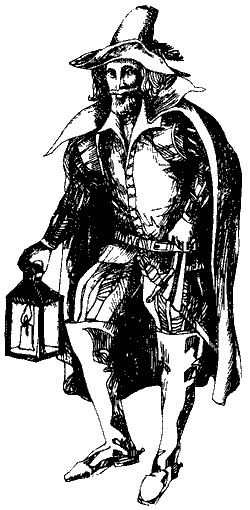|
Guy Fawkes and the Gunpowder Plot
by David A. Wright (UK)
In 1605, Guy Fawkes and a group of conspirators attempted to blow up1 the Houses of Parliament. Queen Elizabeth I died in 1603 and English Roman Catholics who had been persecuted2 under her rule had hoped that her successor3, James I, who had a Roman Catholic mother, would be more tolerant of their religion.
Unfortunately for them, James did not turn out to be4 any more tolerant5 than Elizabeth.
Thirteen young men, under the leadership of Robert Catesby, decided that violent action was the only answer. Catesby felt the thing to do was to blow up the Houses of Parliament, so killing the King, the Prince of Wales and all the Members of Parliament who were making life difficult for the Catholics. Today these conspirators would be known as terrorists.
To carry out their plan, the conspirators obtained of 36 barrels6 of gunpowder7 and smuggled8 them into a cellar9, just under the House of Lords, which is one part of the Houses of Parliament.
 But as the group worked on their plot10, it became clear that innocent people would be hurt or killed in the attack, including some people who supported the Roman Catholics. So some of the plotters started having second thoughts11. One of the group even sent an anonymous letter to warn one of his friends, Lord Monteagle, to stay away from the Parliament on 5th November that year.
But as the group worked on their plot10, it became clear that innocent people would be hurt or killed in the attack, including some people who supported the Roman Catholics. So some of the plotters started having second thoughts11. One of the group even sent an anonymous letter to warn one of his friends, Lord Monteagle, to stay away from the Parliament on 5th November that year.
The warning letter was intercepted12 by (or reported to) the King and plans were set in motion to stop the conspirators.
Guy Fawkes volunteered, or was chosen, to be the one who would set off13 the explosion, making sure that he himself could escape14 – he was not a suicide bomber15!
He was in the cellar of the parliament with the 36 barrels of gunpowder when the authorities stormed it in the early hours of 5th November. He was caught, tortured16 (as was the custom in those days) and eventually executed.
Nobody is sure whether the plan to blow up the Parliament would have worked even if they had not been betrayed17. Some people think that the gunpowder itself was old and useless, but since they were caught before trying to ignite18 it, we will never know!
The Gunpowder Plot made a great impression on the people of England at the time and since. Even today, the reigning19 monarch (king or queen) only enters Parliament once a year, for what is called “the State Opening of Parliament”.
Before each Opening, the Yeomen of the Guard (special ceremonial soldiers who wear fancy20, red, old-fashioned uniforms) search the cellars under the Palace of Westminster.
On the very night that the Gunpowder Plot was foiled21, on 5th November 1605, bonfires were set alight to celebrate the safety of the King. Since then, 5th November has become known as Bonfire Night. The event is commemorated22 every year with fireworks and burning effigies23 of Guy Fawkes on a bonfire.
It is said, tongue in cheek24, that nobody is quite sure whether they are commemorating the saving of Parliament or celebrating the bravery of Guy Fawkes. Like many such occasions, it is now just an excuse to have a party and a lot of fun, particularly for the children.
1 blow up – взрывать
2 persecute – подвергать гонениям
3 successor – наследник
4 turn out to be – оказаться
5 tolerant – терпимый
6 barrel – бочка
7 gunpowder – порох
8 smuggle – тайно проносить
9 cellar – подвал
10 plot – заговор
11 second thought – пересмотр (задним числом)
12 intercept – перехватить
13 set off – производить (взрыв)
14 escape – скрыться бегством
15 suicide bomber – террорист-смертник
16 torture – пытать; мучить
17 betray – предавать
18 ignite – зажигать
19 reigning – царствующий
20 fancy – причудливый
21 foil – разрушать (планы и т. п.)
22 commemorate – отмечать, праздновать
23 effigy – изображение, чучело
24 tongue in cheek – насмешливо-иронически
Читать еще в этой рубрике:
Читать еще в этом номере:
|
|











